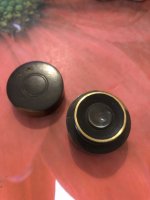fever87
Sr. Member
- Aug 16, 2009
- 303
- 146
- Detector(s) used
- Minelab X-Terra 705, Equinox 600, GPX 4500
- Primary Interest:
- Relic Hunting
Ok, so I've cleaned various iron pieces with electrolisys (and some with apple cider vinegar (both with varying degrees of success)) but here is where I have an issue. I've rinsed the pieces and then baked them in the oven on low for about an hour before I can apply Briwax. The problem is that in the oven they "flash" rust. How do you stop that??
Some pieces that rust like that clean up easily with a wire brush but some I have just set aside until I can find an answer. Thanks for any input!
Some pieces that rust like that clean up easily with a wire brush but some I have just set aside until I can find an answer. Thanks for any input!



